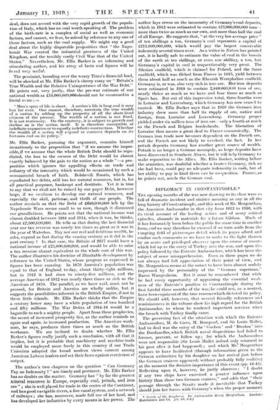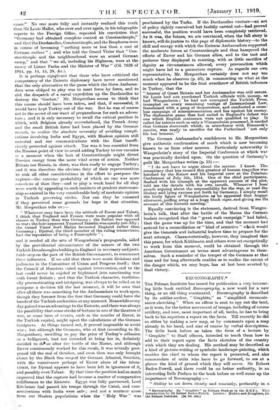DIPLOMACY IN CONSTANTINOPLE.*
THE opening months of the war now drawing to its close were as full of dramatic incident and sinister meaning as any in all the long history of Constantinople, and this work of Mr. hforgenthau, the American Ambassador in that site from 1913 to 1916, with its vivid account of the leading actors and of many critical episodes, abounds in materials for a future Gibbon. Much of it has fortunately been before the public for some time in another form, and we may therefore be excused if we turn aside from the tempting field of picturesque detail which its pages afford and confine such co llllll ents as we have to make to the light thrown by an acute and privileged observrr upon the course of events which led up to the entry of Turkey into the war, anti upon the policy followed by the Entente Ambassadors, which has been the subject of some misapprehension. Even in these peace we do not always foul full appreciation of their point of view, and Mr. Morgenthau seems at the outset to have hems almost unduly impressed by the personality of the " Gernmn euperruan," Baron Wangenheim. But it must he remembered that while he had every opportunity of appraising the essential weak- ness of the Entente's position in Constantinople during the first fateful three months of the war, he could not, as a neutral, have been cognizant of the true reasons which dictated its policy. We should add, however, that several friendly references and reminiscences in the volume show his high regard for the British Ambassador, to whom he rendered important services when the breach with Turkey finally came.
The governing fact of the situation with which the Entente Ambassadors, H. de (tiers', H. Bompanl, end Sir Louis Mallet, had to deal was the entry of the ` Goeben ' and ' Breslau ' into the Dardanelles, which British naval dispositions had failed to foresee, prevent, or follow up ; for which the Ambassadors were not responsible (Sir Louis Mallet indeed only returned to his post after it had happened) ; and which Ille Morgenthau appears to have facilitated (through information given to this German authorities' by his daughter on her arrival just before the German cruisers appeared) without probably fully realizing at the moment the decisive importance of this event (pp. 44-45). Reflecting upon it, however, he justly observes: "I doubt if any two ships have exercised a greater influence upon history than these two German cruisers," and adds that "their passage through the Straits made it inevitable that Turkey should join her forces with Germany's when the proper moment • SAM& of the Boopliorwe. Sty Srubsteader Ileury Norztathas. Loudon: Ilutchlasea and CO. Rh. td. 50.1 came." No one more fully and instantly realized this truth than Sir Louis Mallet, who over and over again, in his telegraphic reports to the Foreign Office, repeated his conviction that "Germany had obtained complete control at Constantinople," and that the Dardanelles, Constantinople, and the Bosphorus were in course of becoming" nothing more or less than a sort of German enclave"; and who told the Grand Vizier that " Con- stantinople and the neighbourhood were an armed German camp," and that "we all, including his Highness, were at the mercy of Liman Pasha and the Minister of War" (Cd. 7628 of 1914, pp. 14, 15, 28, he).
It is perhaps eignificant that those who have oriticized the competency of the Entente diplomacy have never mentioned that the only alternative to the game which the three Ambasea. dons were obliged to play was to meet force by force, and to risk the despatch of a naval expedition up the Dardanelles to destroy the Goeben.' Mr. Morgenthau seems to think that this course should have been taken, and that, if successful, it would have kept Turkey out of the war. But he Was of 00Urse not in the secret of our want of preparedness for such an adven- ture ; and it is only necessary to recall the critical position in which, with Belgians already overwhelmed, the French Army and the small British force had been placed by the German onrush, to realize the absolute necessity of avoiding compli- cations involving India. and Egypt, with Moslem opinion still untested and our communications with the East insuffi- ciently protected against attack. Nor was it less essential from the Russian point of view to avoid adding Turkey to our enemies at a moment when the bait of Constantinople might divert Russian energy from the more vital scene of action. Neither Britain nor Russia, in short, was then ready to engage Turkey; and it was therefore the obvious duty of their representatives to sink all other considerations in the effort to postpone the rupture—the extreme probability of which no one was more conscious of than they—and to play a weak hand for all they were worth by appealing to such instincts of prudent statesman- ship as existed in the very considerable body of moderate opinion in Turkish governing circles. Nor can they be censured if they pero3ived some grounds for hope in that situation. Mr. Morgenthau tells us :— " Whatever may have been the attitude of Enver and Talaat, I think that England and Franoo were more popular with all classes in Turkey than was Germany ; the Sultan was opposed to war; the heir-apparent Youssouf Izzadin was openly pro-Ally ; the Grand Vizier Said Ham faveured England rather than Germany ; Djemal, the third member of the ruling triumvirate, had the reputation of being a Francophile " ; and it needed all the arts of Waugenheim's propaganda, aided by the providential circumstance of the seizure of the two Turkish Dreadnoughts building in England (a necessary and justi- fiable step on the part of the British Government), to counteract these influences. If we add that there were acute divisions and jealousies in the Committee of Union and Progress itself ; that the Council of Ministers voted against intervention, and to the last could never be cajoled or frightened into sanctioning war with Great Britain ; and that the Turkish character, tradition- ally procrastinating and intriguing, was always to be relied on to postpone a decision till the last moment, it will be seen that after all there was something for the Ambassadors to work upon, though they foresaw from the first that Germany could force the hands of the Turkish authorities at any moment. Meanwhile every day gained was an advantage to the Entente, and there was always the possibility that some stroke of fortune in one of the theatres of war, or some turn of events, such as the murder of Enver, in the Turkish capital, might upset the calculations of the German intriguers. As things turned out, it proved impossible to avoid war ; but although the Germans, who at firat (according to Mr. Morgenthau), unwilling to pay the price of Turkey's adhesion as a belligerent, had not intended to bring her in, definitely decided to do's° after the battle of the Mane, and although Enver continuously worked for this result, it was actually post- poned till the end of October, and even then was only brought about by the Black Sea coup of the German Admiral, Souchon, with the connivance perhaps of Enver alone of the trium- virate. for Djemal appears to have been left in ignorance of it, and possibly even Talaat By that time the position had 80 much improved that the rupture had become a matter of comparative indifference to the Entente. Egypt was fully garrisoned, Lord Kitchener had parsed his troops through the Canal, and com- munications with India were safe; and not a murmur arose from our Moslem populations when the "Holy War" was proclaimed by the Turks. If the Dardanelles venture—an sot of policy rightly conceived but faultily carried out—bad proved suceeesful, the position would have been completely retrieved. As it was, the future, we are convinced, when the full story Is known, will do justice to this page of diplomatic history—to the skill and energy with which the Entente Ambassadors supported the moderato forces at Constantinople and thus hampered the efforts of Enver acid his German allies, and to the tact and patienoe they displayed in resisting, with as little saorifiee of dignity as circumstances allowed, every provocation which might have led to a premature rupture. As regards our own representative, Mr. Morgenthau certainly does not say too much when he observes (p. 83), in commenting on what at the moment appeared to be the final overthrow of British influence in Turkey, that the "honour of Great Britain and her Ambassador was still assure. SirLouis had not purchased Turkish officials with money, as had Wangenheim ; he had net corrupted the Turkish Press, trampled on every remaining vestige of International Law, fraternized with a gang of desperadoes, and conducted a cease- lees campaign of misrepresentation and lies against his enemy. The diplomatic game that had ended in England's defeat was one which English statesmen were not qualified to play. It nailed for talents such as only a Wansenheim possessed, it needed that German statecraft which, in aeoordanoe with Bismarok's maxim, was ready to sacrifice for the Fatherland 'not only life but honour.'' The German Ambassador's confidences to Mr. Morgenthau give authentic confirmation of much which is now becoming known to us from other sources. Particularly noteworthy is Wangenheim's story of the Imperial Conference at which war was practically decided upon. On the question of Germany's guilt Mr. Morgenthau writes (p. 55) :— "I do not have to argue about the matter. I know. Tho conspiracy that has caused this greatest of human tragedies was hatched by the Kaiser and his Imperial crew at the Potsdam Conferenee of July 5th, 1914- One of the chief participants, flushed with his triumph at the apparent success of the plot, told me the details with his own mouth. Whenever I hear people arguing about the responsibility for the war, or read the olumsy and lying excuses put forth by Germany, I simply recall the burly figure of Wangeeheim as he appeared that August afternoon, puffing away at a huge black cigar, and giving me the account of this historic meeting."
Equally convincing is the statement, derived from Nl'angen- heim's talk, that after the battle of the Hams the German leaders recognized that the "great rush campaign" had failed, that the game was up for the time, and that the moment had arrived for a reconciliation or " kind of armistice" which would give the Generals and industrial leaders time to prepare for the next attempt. Characteristically, however, they imagined that this peace, for which Kiihimann and others were set energetically to work from this moment, could be obtained through the American Government on terms most advantageous to them- selves. Such a reminder of the temper of the Germans at that time and for long afterwards enables us to realize the extent of the danger which, we may hope, haa at last been averted by final victory.



































 Previous page
Previous page